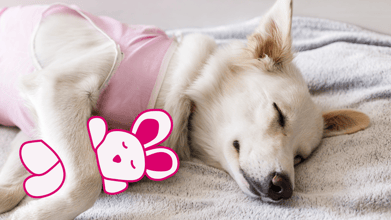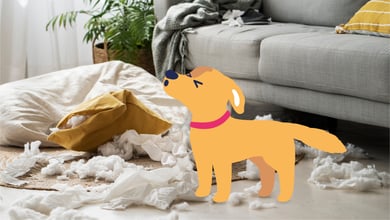Fireworks and Pets: Strategies to Keep Pets Calm

Fireworks are a fun way to celebrate holidays, but the loud booms and flashing lights can be terrifying for our pets. Studies show that roughly 83% of dogs and around 50% of cats experience anxiety during fireworks displays.
This guide will help you understand why fireworks are so scary for pets and provide you with ways to keep your pet calm and comfortable during these loud celebrations. By following these tips, you can minimize your pet’s discomfort and reinforce their safety in the comfort of home.
🔑 Key Takeaways
-
Fireworks can cause stress in your pet as the loud noises, vibrations, and flashes of light can trigger a fight-or-flight response
-
Watch for changes in behavior indicating fear, like hiding, trembling, or excessive vocalization
-
Create a safe haven with familiar items and consider calming aids or medication (consult your veterinarian).
-
Plan ahead for pets and fireworks by leaving furry friends home in a safe space, minimizing noise, and offering distractions
Why Are Fireworks So Scary for Pets?
There are several reasons why fireworks can be so scary for pets, such as:
-
Their hearing is much more sensitive than ours, so the loud noises can be overwhelming
-
Not only are the booms loud, but the vibrations can be felt throughout the body
-
The flashes of light can be startling
-
These unpredictable sounds and sights trigger a primal danger instinct in pets, leading them to want to fight or flee
-
For pets with past traumas, fireworks displays can be especially triggering
-
Some breeds, particularly herding breeds and sporting breeds, are naturally more noise-sensitive
Since fireworks aren't a regular occurrence, pets cannot become desensitized to them. On top of this, pets can pick up on our anxiety, so it's essential to stay calm for their sake.
Signs Your Pet is Feeling Stressed
Signs that your pet is becoming overly stressed and anxious during fireworks include:
-
Sudden alertness
-
Flattened ears
-
Refusal to go outside or attempts to escape
-
Restlessness
-
Excessive vocalization (whining, barking, etc.)
-
Hiding
-
Clingy behavior
Tips to Keep Your Pet Calm During Fireworks
Here are some tried and true strategies to help keep your pet calm and reinforce their safety during fireworks displays:
1. Create a safe haven
Create a quiet space in your home, like a crate or kennel covered with a blanket, where your pet can feel secure.
2. Provide anxiety medication
Talk to your veterinarian about medications like Trazodone or Gabapentin or calming supplements like Rescue Remedy or Solliquin.
Never administer medication to your pet without first consulting with a veterinarian.
Prescription Trazodone Dosage for Dogs
Prescription Trazodone Dosage for Dogs
View Results
Your Pet's Results
The suggested Trazodone dosage range for your dog is , taken by mouth.
While Trazodone is not FDA-approved for use in dogs, it is commonly prescribed for off-label use. Share the results of your dog’s dosage recommendation with your veterinarian and discuss whether Trazodone is a good choice for them.
The content of this quiz was medically reviewed by Dr. Lyndsey Kingsley. This quiz is not meant to take the place of a medical diagnosis from a veterinary doctor.
Share Quiz
3. Rewards-based comfort
Offer your pet high-value treats or toys during fireworks displays to create a positive association with the noise.
4. Desensitization training
If you live in an area with frequent fireworks displays, consider desensitization training to gradually acclimate your pet to the sounds. There are many resources available online and from veterinary professionals to help you with this process.
5. Stay with your pet
Don't leave your pet home alone during fireworks. Your presence and comfort can help them feel safe.
6. Minimize noise
Close windows and doors to muffle the sound of fireworks. The less jarring the sounds coming into your house from outside, the less stressed and scared your pet would be.
7. Play calming sounds
Use white noise machines or play classical music to help mask the fireworks noise.
8. Distract them with toys
Keep your pet occupied with toys, videos, or games during fireworks displays.
9. Purchase a Thundershirt
Thundershirts are specially designed to apply gentle, constant pressure that can have a calming effect on some pets.

Planning Ahead for the Fourth of July
For holidays with fireworks displays, like the Fourth of July, it's important to plan ahead and implement the strategies listed above. Fireworks displays can be overwhelming for pets, so it's best to leave them at home in a safe and quiet space. If you do have to leave your pet home alone, make sure to crate them with familiar comfort items and avoid taking them outside for potty breaks or walks during fireworks displays.
More pets go missing on the Fourth of July than any other holiday. A well-fitted harness is essential if you must go out with your pet during fireworks to prevent them from slipping out of their collar if they get startled. Finally, make sure your pet's ID tags and microchip information are up to date in case they escape during the festivities.
Peace of Mind Is Just a Microchip Away
Find your furry friend if they get lost with in-home microchipping.
Conclusion
Fireworks are a part of many celebrations and become more frequent on and around the Fourth of July holiday. These displays can be stressful for our furry companions. With the understanding that fireworks can be very scary for pets and by implementing the strategies above, you can create a safe and comfortable environment for them to help minimize anxiety.
Remember, a little preparation can go a long way in keeping your pet calm and happy during this busy (and noisy) time. By following these tips, you can help teach your pet that they are safe at home, despite the noise and activity happening outside.
Frequently Asked Questions
Do fireworks affect pets?
Yes. Pets have sensitive hearing and are not used to the unpredictable loud booms which create stress and anxiety.
Can I take my dog to the fireworks?
No. Fireworks can cause panic in fear in dogs and trigger them to react in a way that is not normal. Not only can it cause fear, but some dogs may escape putting them in further danger.
How to protect pets from fireworks?
Keep them home, provide a safe place for them, and consider calming medications or supplements, treats and toys, background classical music, or white noise.
What dog breed is most scared of fireworks?
Any dog can be sensitive to fireworks regardless of breed. Herding or working breeds have been known to be more sensitive to loud noises.
Sources
- Hargrave, C. (2014). How to reduce the impact of firework season for owners of sound sensitive pets. The Veterinary Nurse, 5(8), 468–472. https://doi.org/10.12968/vetn.2014.5.8.468
- Sherman, B. L., & Mills, D. S. (2008). Canine anxieties and phobias: An update on separation anxiety and noise aversions. Veterinary Clinics of North America: Small Animal Practice, 38(5), 1081–1106. https://doi.org/10.1016/j.cvsm.2008.04.012






